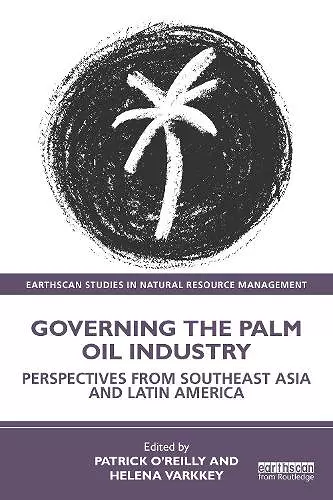Governing the Palm Oil Industry
Perspectives from Southeast Asia and Latin America
Helena Varkkey editor Patrick O'Reilly editor
Format:Paperback
Publisher:Taylor & Francis Ltd
Published:23rd Aug '24
Currently unavailable, and unfortunately no date known when it will be back
This paperback is available in another edition too:
- Hardback£150.00(9781032605555)

This book examines how different countries across Southeast Asia and Latin America respond to the emergence and expansion of the lucrative, yet controversial palm oil industry, paying attention to how national policy and governance regimes are shaping this global industry.
With its historic roots in Southeast Asia, oil palm cultivation continues to expand beyond its historical centres. In Latin America, many countries are now developing their own policies to promote and govern oil palm cultivation. This book provides a unique examination of how different countries strive to strike a balance between developmental and environmental concerns, through case studies on Indonesia, Malaysia, the Philippines, Thailand, Colombia, Brazil, Ecuador, Honduras, and Mexico, and an outlook for the industry's prospects in Africa. This book applies an assemblage approach to draw out lessons on the global challenges posed by the industry and how differing national governance regimes and communities might respond to them. Rather than a single global industry, the book unveils a complex arrangement of national and even local palm oil assemblages, indicating that there is more than one way to do palm oil. In doing so, the book contributes to a better understanding of the drivers and processes that shape the governance of the industry, both in different nations and globally.
This book will be of great interest to students and scholars of the palm oil industry, as well as those interested in natural resource governance, sustainable agriculture, conservation, environmental justice, and environmental and development policy more broadly.
“As palm oil production continues to expand in Southeast Asia, while also moving into Latin America and Africa, this timely volume challenges the notion that there can be one single approach to making palm oil production sustainable. Instead, based on a great variety of case studies, the book highlights the diversity of national governance regimes that seek to find solutions to the longstanding challenge of reconciling environmental protection, social welfare and justice, and economic development. The book thus offers a novel perspective and new empirical insights on one of the world’s most important, and most contested, agricultural commodities.”
Karen M. Siegel, Head of Research Group “Transformation and Sustainability Governance in South American Bioeconomies”, University of Münster, Germany
“This timely edited volume draws on the methodology of ‘the palm oil policy assemblage’ to reveal the deep complexities of this industry in different parts of the world. The book’s comparative approach across two key palm oil producing regions in the global South, namely Southeast Asia and Latin America, coupled with a final chapter on the African setting, shows how the industry in different sites combines different mixes of human actors and non-human entities (landscapes, soils, pests, technology) that interact to shape diverse national and local governance complexes. Their insightful findings call into question ‘one-size fits all’ approaches to governing palm oil.”
Helen E. S. Nesadurai, Professor of International Political Economy, Monash University Malaysia
“Amidst the seemingly relentless march towards the climate crisis, the desire for economic development, and the desperate calls for global justice, palm oil industry continues to be one of the hottest -and most complex- sites of contestation between different forces with diverging interests. In this volume, a group of experts, gathered by the world’s leading authorities on the topic, attempts to dissect these complexities by looking at the governance of the industry in key countries in the Global South. This is an indispensable volume for everyone concerned with global environmental politics, political economy, development, and -most importantly- our common future.”
Shofwan Al Banna Choiruzzad, Associate Professor, Faculty of Social and Political Sciences, Universitas Indonesia
“Palm oil is a highly efficient and profitable system of production that has taken over forested landscapes across the tropical Global South, ruthlessly driving agrarian development that has not always benefited the local peoples. The book presents an excellent overview of governance of the palm oil industry, and provides an exciting approach to examining the complex assemblages of intertwined materialities, actors, interests, power, discourses, spatial dynamics, ecologies, and political-economic processes across different scales. This book is thus an important contribution to understanding the possibilities for if, and how, the palm oil ‘complex’ will be able to adequately respond to sustainability and justice demands.”
Grace Y. Wong, Associate Professor, Research Institute for Humanity & Nature and Stockholm Resilience Centre
“The oil palm industry faces unprecedented challenges both in its main production regions and globally. This book highlights the policy, governance, management and ethical challenges that will determine the future of oil palm as a global commodity, notwithstanding the existential threat posed by changing climates on productivity and yields. Those charged with charting a future for the oil palm sector are well advised to consider the questions that this timely, indeed overdue, book raises. How these challenges are addressed will determine the future of oil palm landscapes as global public goods and/or increasingly stranded private assets.”
Chair (Emeritus) in Global Food Security, University of Nottingham and Member, UN High- Level Panel of Experts in Food Security and Nutrition (HLPE-FSN)
ISBN: 9781032605524
Dimensions: unknown
Weight: 467g
300 pages